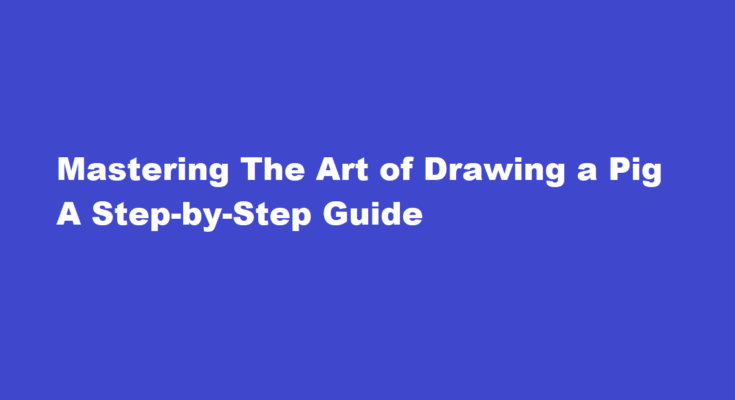Introduction
Drawing is a form of artistic expression that transcends language barriers, allowing us to communicate and connect through images. One popular subject for artists of all skill levels is the humble pig. So, grab your sketchbook, sharpen your pencils, and let’s embark on this creative journey.
Materials
Before we begin, gather your materials
1. Drawing paper or sketchbook
2. Pencils (2B, 4B, and 6B for shading)
3. Eraser
4. Ruler (for measurements)
5. Reference image (optional)
Basic Shapes
Start by sketching the basic shapes that make up a pig. Draw an oval for the pig’s body and a smaller circle for its head. Add a curved line connecting the two for the neck. These simple shapes will serve as your framework for the pig’s body proportions.
Outline the Head
Refine the head by adding details. Sketch the snout by extending a curved line from the circle, tapering it slightly towards the end. Draw small circles for the eyes, making sure they’re evenly spaced. Add triangular ears on top of the head, curving slightly outward.
Body and Legs
Extend the oval to create the pig’s body. Add four curved lines for the legs, making them sturdy but not too thick. Remember that pigs are typically stocky animals. Pay attention to the proportions as you draw the legs, ensuring they look balanced.
Tail and Tail Curvature
Draw a short, curly tail near the rear of the pig. Make it spiral slightly, adding a whimsical touch to your drawing. Pigs often have adorable, curly tails, so take your time to get this detail right.
Facial Features
Refine the pig’s face by adding a small, round snout at the end of the snout guideline. Draw the nostrils as two small ovals and add a smiling mouth below. You can also give your pig character by adding eyelashes to the eyes.
Hooves and Details
Sketch the pig’s hooves, which are short and stubby, at the end of each leg. Add details like the pig’s trotters, which are divided into two or three sections, depending on your preference. Don’t forget to draw the pig’s tail with a curly tip.
Shading
Now comes the fun part – shading! Use your 2B pencil to shade the darkest areas, like the pig’s eyes, nostrils, and under its snout. Gradually transition to the 4B and then the 6B for lighter shading. Pay attention to the direction of light, making sure it falls consistently on your pig.
Texture
To give your pig a realistic look, add texture with light, circular strokes using your 2B pencil. Pigs have coarse, bristly hair, so make sure the texture reflects this. Focus on the head and body, leaving the legs smoother.
Highlights
To make your pig pop, add highlights using your eraser. Lightly erase areas where light would naturally hit, like the top of the head, the back, and the legs. This contrast between light and shadow will make your pig look three-dimensional.
Final Touches
Review your drawing and make any necessary adjustments. Add extra details, like a tuft of hair on top of the head or more texture on the body. Sign your artwork and date it, marking the completion of your adorable pig drawing.
FREQUENTLY ASKED QUESTIONS
How to design a pig pen?
Inside a barn or shed, plan for at least 50 square feet per pig. Ideally, your pig pen would be twice as long as it is wide. An 8- by 16-foot pen would be enough so two feeder pigs could stretch their legs. Pigs kept indoors should be protected from drafts but must also have good ventilation.
What’s a pig pen?
/ˈpɪɡˌpen/ (also pigsty, us/ˈpɪɡˌstɑɪ/) an enclosed area where pigs are kept. A pigpen is also a dirty or messy place: Your bedroom is a pigsty!
Conclusion
Drawing a pig is a delightful artistic endeavor that allows you to explore your creativity and sharpen your skills. By following these ten steps, you can create a charming pig drawing that reflects your unique style. Remember, practice makes perfect, so keep drawing and experimenting with different techniques to refine your pig-drawing skills. Happy drawing!
Read Also : Mastering The Art of Drawing a Palm Tree A Step-by-Step Guide



